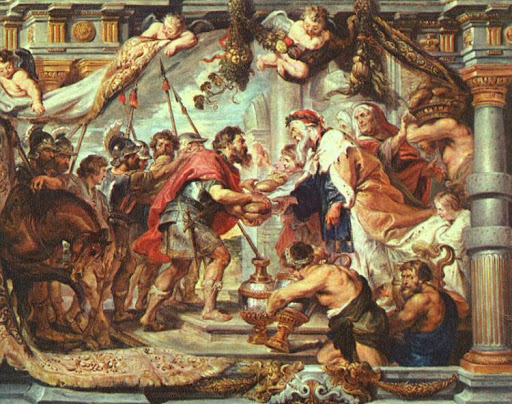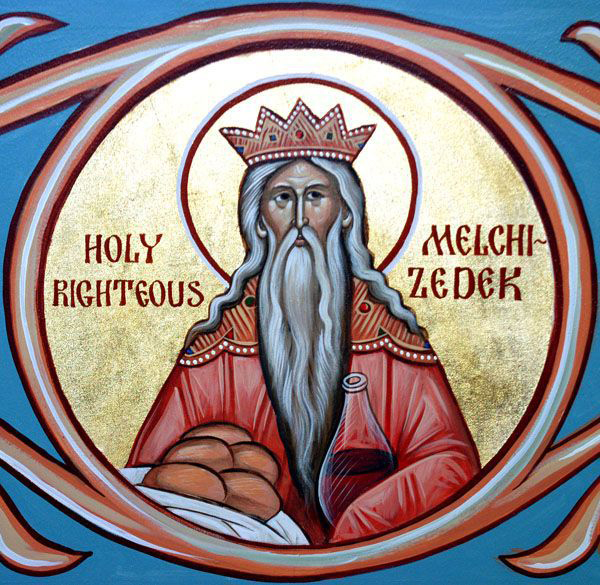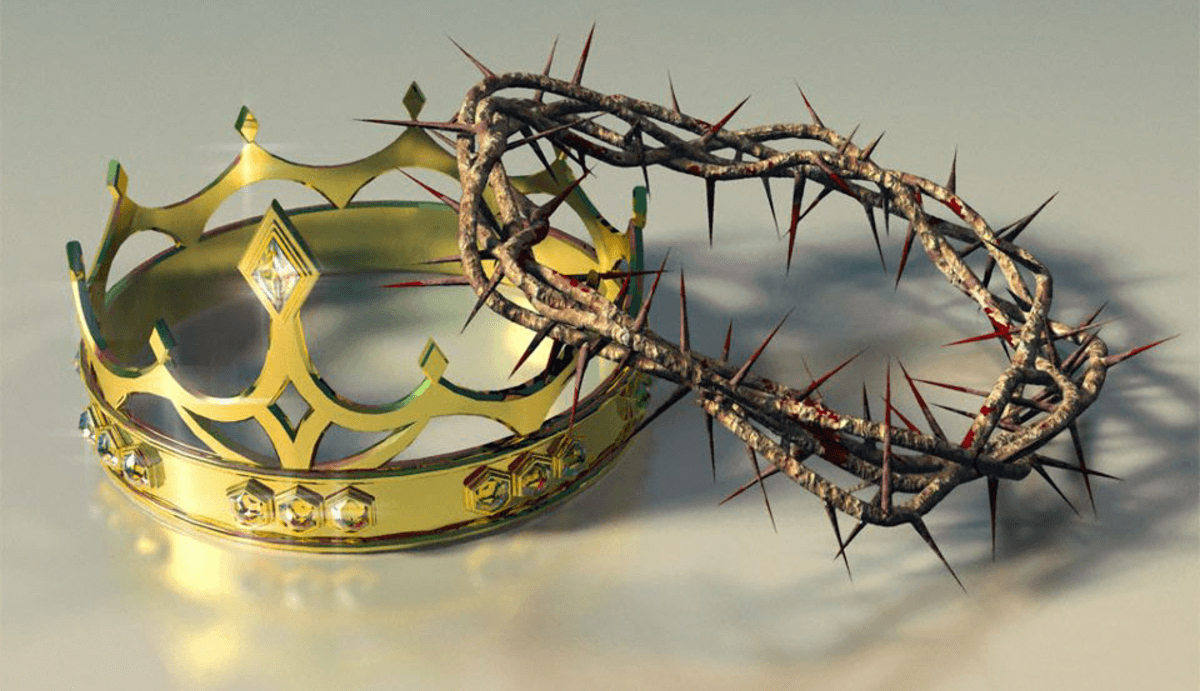
 An early-1970s hit song opened with the searching words: “If a picture paints a thousand words, then why can’t I paint you? The words would never show the you I’ve come to know.”1
An early-1970s hit song opened with the searching words: “If a picture paints a thousand words, then why can’t I paint you? The words would never show the you I’ve come to know.”1
A picture is said to “paint a thousand words” because a picture, whether a painting or a photograph, conveys information that would require pages and pages of words to describe, and even then, some details would likely be missed. (Picture to the left: Marie Joséphine Charlotte du Val d'Ognes (1786–1868) 1801 - Marie Denise Villers French)
Symbols are the pictures of Scripture that paint a thousand words. A symbol conveys a wealth of nuances that would be lost otherwise. A prime example of Biblical symbology is found in John the Baptist’s reference to the Saviour as “the Lamb of Yah that taketh away the sins of the world.” (John 1:29, KJV) Without any other words being said, this reference immediately brings to mind the entire sacrificial system put into place to redeem fallen man.
Another symbol presented in Scripture is that of Melchizedek. Psalm 110:4 states: “Yahuwah hath sworn, and will not repent, Thou art a priest for ever after the order of Melchizedek.” The importance of this obscure reference is underscored when the author of the book of Hebrews quotes this verse word-for-word in Hebrews 7:17: “For he testifieth, Thou art a priest for ever after the order of Melchisedec.” (KJV)
The Bible always explains itself so to understand this symbol, all one has to do is turn to Genesis 14 and learn who Melchizedek was and for what he was known.
Years before Isaac was born, putting a twinkle in Abraham’s eye and a laugh on Sarah’s lips, Lot and his family were taken captive in a war between a number of Canaanite kings. When Abram heard the news, he immediately gathered together a small army of servants and pursued the invading force to the far north where he recovered everyone who had been stolen, along with all the goods pillaged from the cities of the plain.
When Abraham and his private army returned to the south, a mysterious figure comes out to meet him. Genesis 14:18 says, “And Melchizedek king of Salem brought forth bread and wine: and he was the priest of the most high God.”
Melchizedek was a king and he worshipped the “most high God,” Yahuwah. But the story doesn’t end there. Melchizedek pronounced a blessing upon Abram who then paid tithes to Melchizedek!
After receiving tithes from Abraham, this mysterious man retreats into the mists of the distant past and he is never seen again. We do not know where he came from; we don’t know who his progenitors were; we don’t know how he even came to be a priest of Yah. All superfluous information is stripped away and only the most essential information is presented. He appears briefly in the sacred record, and just as swiftly withdraws, but in this mysterious person are hidden details that teach rich lessons about the ministry of the resurrected Saviour.

The very name, Melchizedek, means “king of righteousness.” Scripture provides an unerring record of the failings and weaknesses of even the most committed followers of Yah, but no such record exists of Melchizedek. In this, he is a fitting emblem of Yahushua. No other human being pointed more fully to Christ than Melchizedek.
The author of Hebrews explained:
Now consider how great this man was, to whom even the patriarch Abraham gave a tenth of the spoils. And indeed those who are of the sons of Levi, who receive the priesthood, have a commandment to receive tithes from the people according to the law, that is, from their brethren, though they have come from the loins of Abraham; but he whose genealogy is not derived from them received tithes from Abraham and blessed him who had the promises. Now beyond all contradiction the lesser is blessed by the better. Here mortal men receive tithes, but there he receives them, of whom it is witnessed that he lives. Even Levi, who receives tithes, paid tithes through Abraham, so to speak, for he was still in the loins of his father when Melchizedek met him. (Hebrews 7:4-10, NKJV)
The fact that Melchizedek pronounced a blessing upon Abraham, the forefather of Aaron and his priestly lineage, establishes that Melchizedek’s priesthood is superior to that of the later Levitical priesthood.
Melchizedek was more than “King of righteousness.” As King of Salem, he was also “King of peace,” since Salem means peace. Again, another beautiful symbol for Yahushua who is the “Prince of Peace.”
Trinitarians have long speculated that Melchizedek was either the Holy Spirit or the pre-incarnate Christ. Some have even speculated that Melchizedek was the Father in human form. However, such speculations are nothing but error left over from the pagan trinity doctrine. Melchizedek was fully human. Absolutely nothing in Scripture indicates otherwise. Thus, he was a perfect fit to point forward to the Saviour who, Scripture reveals, was also fully human.
In order to redeem the human race where Adam fell, Yahushua had to be fully human. “For if by the one man’s offense many died, much more the grace of God and the gift by the grace of the one Man, Jesus Christ, abounded to many.” (Romans 5:15, NKJV)
Only a fully human type (symbol) could point to the fully human anti-type (reality), Yahushua.
 The fact that Melchizedek was both priest and king while being fully human teaches a very important lesson about Yahushua who, likewise, is both a king and a priest while still being fully human. Yahushua, like Melchizedek before him, was appointed to this high, holy office by Yahuwah Himself. This makes Yahushua’s priesthood superior to that of the Levitical priests who simply inherited it by virtue of their parentage.
The fact that Melchizedek was both priest and king while being fully human teaches a very important lesson about Yahushua who, likewise, is both a king and a priest while still being fully human. Yahushua, like Melchizedek before him, was appointed to this high, holy office by Yahuwah Himself. This makes Yahushua’s priesthood superior to that of the Levitical priests who simply inherited it by virtue of their parentage.
And inasmuch as he [Yahushua] was not made priest without an oath (for they have become priests without an oath, but he with an oath by Him who said to him:
“Yahuwah has sworn
And will not relent,
‘You are a priest forever
According to the order of Melchizedek’”,
by so much more Yahushua has become a surety of a better covenant. (Hebrews 7:20-22, NKJV)
The Levitical priesthood came to an end at the cross, but Yahushua’s priesthood continues forever. This is the Christian’s hope:
Also there were many [Levitical] priests, because they were prevented by death from continuing. But he [Yahushua], because he continues forever, has an unchangeable priesthood. Therefore he is also able to save to the uttermost those who come to Yahuwah through him, since he always lives to make intercession for them.
For such a High Priest was fitting for us, who is holy, harmless, undefiled, separate from sinners, and has become higher than the heavens; who does not need daily, as those high priests, to offer up sacrifices, first for his own sins and then for the people’s, for this he did once for all when he offered up himself. For the law appoints as high priests men who have weakness, but the word of the oath, which came after the law, appoints the son who has been perfected forever. (Hebrews 7:23-28, NKJV)
Yahushua, like Melchizedek, was appointed directly by Yahuwah for a special office. And by virtue of his own shed blood, all who accept his death, resurrection, and ministry in their lives, stand before Yah as though they had never sinned.
|
For more information about Melchizedek and what this ancient priest-king reveals about the Saviour and the plan of redemption, look for the WLC Radio episode: “Melchizedek: Once & Future King.”
|

1 “If,” David Gates.